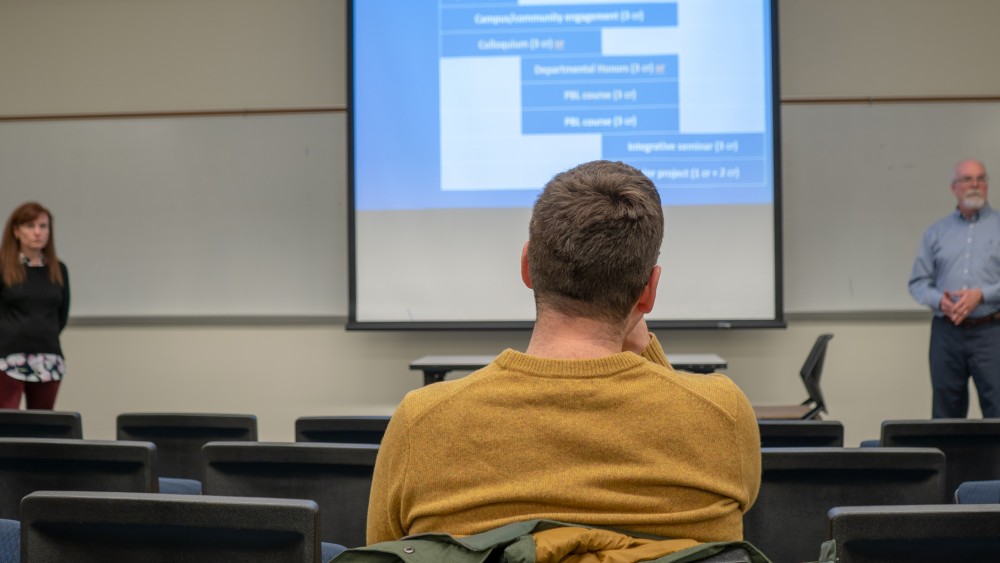Honors College fields public opinions in reworking honors curriculum

GVL / Ben Hunt
Nov 26, 2018
Grand Valley State University’s Frederik Meijer Honors College is currently in the stages of proposing changes to the honors curriculum. If adopted, revisions to the curriculum could be seen in the fall semester of 2020.
The current honors curriculum includes a First Year Interdisciplinary Sequence (12 credits), Disciplinary Courses to satisfy additional remaining General Education requirements, a Junior Seminar (three credits) and a Senior Honors Project (one to four credits).
Over the past summer, members of the Honors Curriculum and Development Committee met to draft ideas for possible revisions. Forums were held in October and November to receive student and faculty feedback and gain new ideas, the latest of which was held on Tuesday, Nov. 20.
“We got to answer questions that people had, as well as gauge support for various parts of the curriculum,” said Chair of Honors Faculty Coeli Fitzpatrick. “We were happy to hear support from faculty for the Problem Based Learning course and the Colloquium course. We were also delighted to see that departments are keen to develop courses that can be offered in our program.”
One proposal seeks to retain the First Year Sequence Course and the Junior Seminar, but incorporate a more defined Second Year Experience by requiring the completion of community or campus engagement (such as tutoring, research assisting or interning), as well as take a problem-based learning course. In addition, this proposal would slightly alter the traditional Senior Honors Project by allowing a major’s capstone project or independent study to count for it.
The proposal also includes new prep courses for the Senior Honors Project. The draft outline on the Honors College website states that the reasoning behind this is to “ensure that all seniors have direct guidance in thinking about and preparing a successful senior project.”
Honors students expressed mixed opinions on different aspects of the potential revisions.
Freshman honor student Nicole Haberkamp, a biomedical sciences major, is currently taking Theory and Practice of Rights for her sequence. While she said that she enjoys the class and thinks that First Year Sequences are a good thing to keep in the curriculum, she said she wished they could be more tailored to specific students.
“I think they should take your major and interests into account more with the sequence,” Haberkamp said. “I think they do to some extent, but not enough.”
Junior honors student Kayleigh Thomas said she felt the sequence courses were overall beneficial and that it instilled strong academic habits in her.
“I won’t lie, my sequence was a lot of work,” Thomas said. “The professors expect a lot from honors students… I learned a lot about how to succeed as a student… and because it is a year-long class, the opportunity to build strong bonds with professors and fellow honors students was one of my favorite parts.”
However, like Haberkamp, Thomas felt the desire to focus more on her major, and welcomed the chance during her sophomore year to be able to take more courses for her major instead of focusing so much time on honors requirements. As a result, she said that she isn’t sure that implementing stricter second year requirements is a good idea.
Once moving toward classes specific to her major, Thomas she connected with the honors program through means besides required classes.
“I found other ways to be more involved in the honors community through being a mentor for incoming freshmen, and studying abroad through an honors-based program to Haiti,” Thomas said. “I understand that not everyone would want to or be able to become involved in the ways I did, but I still believe the year ‘break’ provides more room to adjust and move around your schedule to balance honors and major requirements.”
According to Fitzpatrick, if the proposals to change the curriculum starting in 2020 pass, current honors students will be “grandfathered in” and will only have to meet old requirements.
While changes to the curriculum would not affect any current honors student, freshman Sydney Ford said that she supported the revision of the Seniors Honors Project to allow a major capstone project or independent study to count for it.
“Senior Project is a big part of being in the Honors College,” Ford said. “Everyone tells me about it. But if you can get the credit for the project interning or doing something for your major, that’s great.”

























